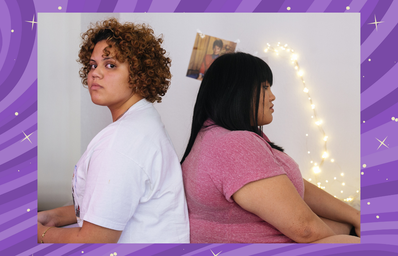Chances are, you’ve been hearing the phrase “use your words” since preschool. And although we’re no longer 3-year-olds battling it out for crayons, good communication is still essential — especially when it comes to you and your significant other. Despite your best intentions, communicating well with your partner can be tricky, and can lead to discomfort, frustration, and even resentment over time. So, it’s crucial to address them while you can!
The good news is, even if you’ve slipped up in the past it’s never too late to change your ways. Here are five communication mistakes in relationships to watch out for — and tips for how to fix them — according to a human behavior expert.
1. Kitchen-sinking
Think about the last argument you had with your SO. What was it about? When you started going back and forth with your partner, did you stick to the topic that started the disagreement, or did you start bringing up each and every complaint that’s ever passed through your mind since the dawn of time — err, the beginning of your relationship? If you and your partner suddenly started “piling on” complaints (similar to dishes piling up in the sink), you may be encountering kitchen-sinking.
Kitchen-sinking occurs when you make an argument personal and bring up dozens of past problems that distract from the immediate topic or disagreement at hand. For example, maybe your partner previously promised to go to a movie with you, but they bailed because they accidentally double-booked. Then, you bring up all those times they didn’t come to your open mic nights in the past, instead of focusing on the immediate situation.
“Any time someone’s bringing up the past, they indicating resentment and unresolved issues,” says Patrick Wanis, PhD, a relationship and trauma therapist. Couples who “kitchen-sink” often feel really defensive and have trouble staying on-topic; but fortunately, Dr. Wanis has tips for how to deal.
How to fix it
If you’re bringing up past arguments just to deflect blame, it’s probably time to take a different approach. Wanis recommends making a list about the topics that keep coming up and planning a proactive discussion about them when you and your partner are both in a calm state. “You’ll have less arguments in the future if you resolve those issues now,” Dr. Wanis tells Her Campus.
Because arguments and disagreements can get heated quickly, remind yourself that staying on topic is essential. After all, how can you address the original problem if you’re constantly bringing up unrelated ones, or things that occurred so far in the past that it distracts from the present moment? So, the next time you and your SO are arguing, pause and take a second to remember what originally started the fight. Focus on the facts, and try to stay in the present. And if you’re in the middle of the argument and feel far away from the issue at hand, calmly interject by saying, “I think we’ve gotten a little off track here. Originally, I was upset because…” and you’ll be back on track in no time.
2. Freezing your partner out
If you’re still using the silent treatment with your partner, then that preschool reference from earlier is way too relevant. Not only is ignoring your partner immature, but it can be toxic to your relationship as well. Sure, your partner will figure out really quickly that you’re upset and you’ll get the short-term gratification of knowing you’ve made your point, but over time, your SO will feel resentful about your manipulative tactics.
Also, it’s impossible to resolve anything when one person is completely shut off from the other. “You’ll never have success [when this happens],” Dr. Wanis says. “The reason people use the silent treatment is to communicate that they are angry and that they’re trying to hurt you. It’s not a wise approach — it doesn’t solve anything.”
How to fix it
If you tend to close off when you’re upset with your partner, the best “fix” is to simply stop using the silent treatment. The next time you’re angry and feel tempted to ignore or be curt with someone, ask yourself what kind of relationship you want. Is toxic really the way to go? Then, practice active listening and open communication instead of relying on power plays.
“If you want to suggest to your boyfriend or girlfriend that you’re upset, the more mature way to do that is simply to tell him or her,” Dr. Wanis tells Her Campus. Take a moment to cool down if you need, plan what you’re going to say, and wait until you’re in a calm headspace to address the issue with your partner. Try saying something like “I’m feeling angry, because…” to open the conversation, instead of completely closing off and leaving your partner to guess why you’re upset with them. Trust me, your conflicts will be resolved way faster with positive communication, and your SO will appreciate your straightforwardness.
3. Being defensive
So, who likes being told they’ve messed up? That’s right, crickets. Criticism and feedback — even when it’s constructive — can be hard to take, especially when you’re in a relationship and inevitably value what the person thinks of you. However, when it comes to your love life, being open to feedback is an essential part of good communication.
Let’s say your partner tells you that you seemed a little quiet at dinner. Do you assume they’re calling you moody and snap, “Do you know how much homework I’ve had this week?! I’m obviously exhausted!” or, do you say, “Yeah, I’ve had an intense week, and I need a dose of Nutella and Game of Thrones to rejuvenate.”
In case it’s not obvious, you want your response to be more like the second — honest, calm, and not defensive, even if you may feel the impulse at first.
How to fix it
“Feeling insecure or feeling threatened makes you defensive,” Dr. Wanis tells Her Campus. He says that by figuring out the root of your behavior, you can usually modify your response. For example, instead of immediately snapping back when your partner brings up something that’s bugging them, pause, recognize that you feel attacked, then try to respond appropriately. If you’re feeling triggered in the moment and need a little more time to calm down, you can even say, “I’m feeling a little defensive right now. Can we talk about this later tonight or tomorrow? I definitely want to hear what you have to say, but I want to be in the right state of mind so I can really listen.”
You can also ask your partner to clarify their complaint or issue. 99% percent of the time, it will be about a smaller issue than you’re anticipating, so once your SO explains what they mean, you probably won’t feel as big of a need to defend yourself.
Dr. Wanis says that practicing mindfulness can be another helpful way to lower your defenses. “Practice mindfulness: being aware of your thoughts so you can separate them from your actions,” he tells Her Campus. Remember: You don’t always have to agree with the criticism in your relationship, but it’s helpful to get used to giving and receiving it.
4. Having arguments over text
When arguing with your partner from afar, it doesn’t matter how many emojis you use — it’s always way more difficult to communicate over text than in person! For example, “I’m sorry” can mean “I’m genuinely apologetic” or “I’m sorry you feel that way” — and you have no way of knowing which “I’m sorry” your SO is using without body language, tone of voice, and facial expressions.
“The best ways to communicate are through body language and voice tonality,” Dr. Wanis tells Her Campus. “With texting, you completely remove that.” Given the virtual world we live in, you likely won’t stop texting and calling your partner altogether, especially if your relationship is long-distance. However, there are some things you can do to make things easier on your relationship in the long run.
How to fix it
On your end, it’s easy: Don’t send any angry texts that could lead to a fight. But what if your SO is the one to start things? If you get a message saying something like, “BTW, I really did not appreciate how you acted tonight,” reply with, “I really want to talk about this — can we talk on the phone or in person?” Then, give them a time or opportunity to discuss the problem so they know you genuinely care. Bonus: By the time you meet up face-to-face, things will probably have cooled down!
If you’re in a long-distance relationship, I have semi-unfortunate news: Virtual fights are almost inevitable. However, if you can, try to move the conversation to a video chat, at least.
5. Trying to “win” the argument
When it comes to sports, the lottery, and random free stuff in college, winning is awesome. However, when you try to win at fighting, most of the time, you actually lose. Trying to “win” arguments in your relationship can be a slippery slope, so it’s important to practice constructive communication instead.
According to Dr. Wanis, focusing on who’s “right” distracts you from the real mission of any conversation: creating room for understanding, and potentially arriving at a compromise you can both agree on. For example, suppose a discussion about whether you should spend celebrate Thanksgiving at their house or your house turns into you trying to prove that their mom dislikes you. At a certain point, you’re so caught up in convincing them you’re “right” that you’re totally unresponsive to whatever they’re saying — and making them less likely to listen to you! Coming to an agreement is way less likely, and definitely takes a toll on any relationship over time.
How to fix it
Remind yourself that you’re not Rocky, and this isn’t a boxing match, so stop trying to win! If your partner hates that you sometimes send drunk Snapchats with your friends, don’t spend the whole argument trying to get them to recognize that you’re totally innocent. Instead, figure out the root of the problem (are they mad that you’re Snapping under the influence, or because you’re spending time with guy friends?) and come up with a solution.
Similar to over-defensiveness, Dr. Wanis recommends using mindfulness as a technique to release control of trying to “win.” He tells Her Campus, “If you find yourself always needing to be ‘right,’ pause, observe your behavior, and detach yourself. Then, you can stop trying to win the argument and focus on what’s really important.”
Personally, I’d like to amend the advice of every preschool teacher in the world: It’s not just “use your words,” but “use your words wisely.” Good communication is key to a healthy relationship, so if you and your SO are guilty of any of these five communication mistakes, it’s never too late to start tackling them. Now can someone please pass the crayons?
Experts Patrick Wanis, PhD, Human Behavior & Relationship Expert

